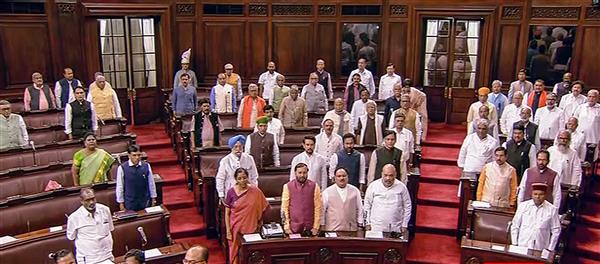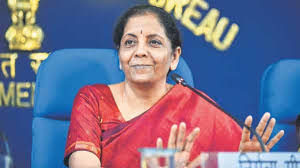
Rajya Sabha (File Photo)
New Delhi: Rajya Sabha Deputy Chairman Harivansh, NCP supremo Sharad Pawar, BJP’s newest recruit Jyotiraditya Scindia and Congress veteran Digvijay Singh are among those in the fray for elections to 55 Rajya Sabha seats to be held on March 26 with a number of the contestants set to get elected unopposed.
Friday was the last date of filing of nominations for the biennial polls. Fifty-one of these 55 seats from 17 states are falling vacant on different dates in April due to retirement of sitting members, while four other seats are already vacant due to resignation of members.
Bypoll will also be held to a Rajya Sabha seat from Haryana vacated by former Union minister Birender Singh.
Counting will be held on the evening of 26 March, an hour after the conclusion of polls.
A keen battle is on the cards in Madhya Pradesh, where the Kamal Nath government faces a grim future following rebellion by at least 22 MLAs, as both the BJP and the Congress have announced two candidates each for the state’s three seats.
Scindia and Digvijay Singh are expected to comfortably win in the polls. The BJP’s Sumer Singh Solanki and Phool Singh Baraiya of the Congress are likely to slug it out for the third seat.
The two parties are comfortably placed to ensure the win of one of their candidates, and while the Congress appeared to have an edge for the third seat but the decision of its 22 MLAs to resign from the state assembly has upended the numbers game.
Most of these MLAs are supporters of Scindia, who joined the BJP on Wednesday after quitting the Congress a day before.
The official tally of the Congress in the 228-member assembly is 114 and the party also enjoyed the support of four Independents, two BSP and one SP MLA.
If the resignations of the 22 MLAs, who are camping in Bengaluru, are accepted or they abstain from voting in the Rajya Sabha polls, then the actual strength of the assembly will fall to 206. The Congress, on its own, will then have 92 members and the BJP 107 seats.
Two other candidates — BJP’s Ranjana Baghel and Ram Das Dahiwale, an independent — have also filed their nominations in Madhya Pradesh.
Apart from Madhya Pradesh, there are seven vacancies from Maharashtra, six from Tamil Nadu, followed by five from West Bengal and Bihar, four each from Odisha, Gujarat and Andhra Pradesh, three each from Assam and Rajasthan, two each from Telangana, Chhattisgarh, Haryana and Jharkhand, and one each from Himachal Pradesh, Manipur and Meghalaya.
The ruling Bharatiya Janata Party and the opposition Congress are expected to win most of the seats in the elections but the two will also see their strength diminished marginally.
The Trinamool Congress and the YSR Congress Party are expected to make significant gains in the 245-member Upper House after the March 26 elections.
For the seven Rajya Sabha seats falling vacant in Maharashtra, Pawar and Union minister Ramdas Athawale, both sitting Rajya Sabha members; BJP’s Udayanraje Bhosale, a descendant of Maratha warrior king Chhatrapati Shivaji Maharaj, and Bhagwat Karad; Congress general secretary Rajiv Satav, Shiv Sena deputy leader Priyanka Chaturvedi and former NCP minister Fauzia Khan are in the fray.
Neighbouring Gujarat is also expected to witness a close contest with three candidates from the BJP — Abhay Bharadwaj, Ramilaben Bara and Narhari Amin — and two from the Congress — Shaktisinh Gohil and Bharatsinh Solanki — filing their nomination papers on Friday for four vacant seats.
In the 182-member state assembly, the BJP has 103 members, the Congress 73, the Bharatiya Tribal Party 2, the NCP 1 and independent 1. Two seats are lying vacant.
For victory on all the three seats, the BJP will require 111 votes, while the Congress will need 74 votes to win two seats.
Independent MLA Jignesh Mevani on Friday extended his support to the Congress.
In West Bengal, the ruling TMC has fielded Dinesh Trivedi, Arpita Ghosh, Mausam Noor and Subrata Bakshi. Its former MLA Dinesh Bajaj has also filed his nomination and may get the party’s backing, TMC insiders said.
Leader of Opposition Abdul Mannan alleged that Bajaj has been fielded by the TMC to defeat CPI(M)-Congress consensus candidate Bikash Ranjan Bhattacharyya in the fifth seat.
All the five candidates in Bihar — Harivansh (JDU), Ram Nath Thakur and Vivek Thakur (both BJP) and Prem Chand Gupta and A D Singh (both RJD) are expected to be declared elected on March 18, the last date for withdrawal of nominations.
For the two seats in Jharkhand, the ruling JMM-Congress-RJD alliance has fielded JMM chief Shibu Soren and Shahzada Anwar of the Congress, while state BJP president Deepak Prakash is the party’s candidate.
All the four BJD candidates — Subhas Singh, Munna Khan, Sujit Kumar and Mamata Mahanta — are expected to win from Odisha.
The BJP has field former Congress MP Bhubaneswar Kalita in Assam and will back its ally BPF’s candidate Biswajit Daimary, a two-time Rajya Sabha MP.
For the third seat, senior journalist Ajit Kr Bhuyan is contesting, backed by opposition Congress and AIUDF.
In Chhattisgarh, Congress nominees K T S Tulsi and Phulo Devi Netam are set to get elected unopposed from the two seats.
The opposition BJP did not field its candidate in view of its low strength in the assembly.
Former Himachal Pradesh chief of the BJP’s Mahila Morcha Indu Goswami is also set to win unopposed.
Chief Minister Jai Ram Thakur said the BJP had sought cooperation from the Congress and the opposition party decided not to field a candidate for the Rajya Sabha seat.
In Rajasthan, where elections will be held to three Rajya Sabha seats, the Congress has nominated AICC general secretary K C Venugopal and state general secretary Neeraj Dangi, whereas the BJP has named Rajendra Gehlot as its candidate. Senior BJP leader Omkar Singh Lakhawat surprisingly also filed his nomination paper, saying he did it on the directions of his party.
From Haryana, BJP nominee Ram Chander Jangra and Congress’s Deepender Singh Hooda are set to enter the Upper House of Parliament unopposed.
Birender Singh’s term was to end on 1 August, 2022 but he resigned on January 20. BJP’s Dushyant Kumar Gautam is set to enter the Upper House for the remainder of the term.
The ruling YSR Congress is expected to comfortably bag all the four seats in Andhra Pradesh, given its strength of 151 in the 175-member assembly.
Though the TDP stands no chance of winning as it has only 23 MLAs it nevertheless chose to field one candidate.
In Telangana, both the candidates of the ruling TRS — Keshava Rao and Suresh Reddy are expected to emerge victorious as the party enjoys a
strength of 101 in the 120-member assembly.
National People’s Party (NPP) state president W R Kharlukhi is the nominee of the ruling Meghalaya Democratic Alliance.
Manipur’s titular king Leisemba Sanajaoba is the BJP’s nominee in Manipur.
Courtesy: First Post







































